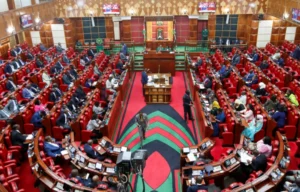Kenya raises legal drinking age to 21 in sweeping policy to curb youth alcohol abuse
This measure is part of a broader effort to delay the age of first alcohol exposure and combat increasing rates of substance abuse among Kenya’s youth.

Interior and National Administration Cabinet Secretary Kipchumba Murkomen, joined by NACADA CEO Anthony Omerikwa, launches the NACADA National Policy for the Prevention, Management and Control of Alcohol, Drug and Substance Abuse at Radisson Blu Hotel in Nairobi, Tuesday, July 30, 2025.Photo/Kipchumba Murkomen).
By Robert Assad
The government has raised the legal drinking age from 18 to 21 in a landmark policy shift aimed at curbing underage drinking and reducing long-term health and social risks, according to new guidelines from the National Authority for the Campaign Against Alcohol and Drug Abuse (NACADA), July 30.
New age limit and access restrictions enforced
Under the new NACADA directive, no person under 21 years will be permitted to consume alcohol or enter any establishment that sells alcohol — regardless of whether they are accompanied by an adult. All licensed entertainment venues and alcohol outlets will be required to enforce the rule strictly or face penalties.
“Additionally, no person under the age of 21 will be allowed to access or enter any alcohol-selling outlets – whether accompanied or unaccompanied by an appropriate adult,” the policy states.
This measure is part of a broader effort to delay the age of first alcohol exposure and combat increasing rates of substance abuse among Kenya’s youth.
Experts link early drinking to lifelong health risks
NACADA officials said early exposure to alcohol is strongly associated with addiction, mental health issues, and risky behavior. By increasing the legal drinking age, the agency hopes to reduce these outcomes.
The policy aligns with global research suggesting that delaying the onset of alcohol use can significantly decrease the likelihood of chronic abuse and dependency later in life.
Celebrities, influencers banned from promoting alcohol
The directive also includes a countrywide ban on the use of celebrities, influencers, sports personalities, and entertainers in alcohol marketing campaigns. The move is intended to reduce the influence of popular figures in promoting alcohol use among adolescents and young adults.
“This policy is aimed at breaking the social glamorization of alcohol, particularly among impressionable youth,” NACADA noted in its statement.
University survey reveals alarming substance use
The announcement follows a NACADA-commissioned study conducted in February 2025 that examined drug and substance use among university students in Kenya. The report found that 87.3 percent of students surveyed had consumed alcohol, making it the most used substance.
Cigarettes were second at 64.4 percent, followed by shisha at 41.2 percent. The survey included responses from 15,678 undergraduate students from both public and private universities.
The findings also revealed that students primarily obtain alcohol and drugs from peers (66.4 percent) and local canteens and bars (59.3 percent), raising concerns over easy accessibility.
Community efforts and faith-based partnerships
To support the enforcement of the new law, NACADA has been engaging communities and partnering with faith-based organizations to raise awareness about the dangers of substance abuse.
The agency called on all stakeholders, including law enforcement, educators, parents, and religious leaders, to support the new policy to protect the nation’s youth.





